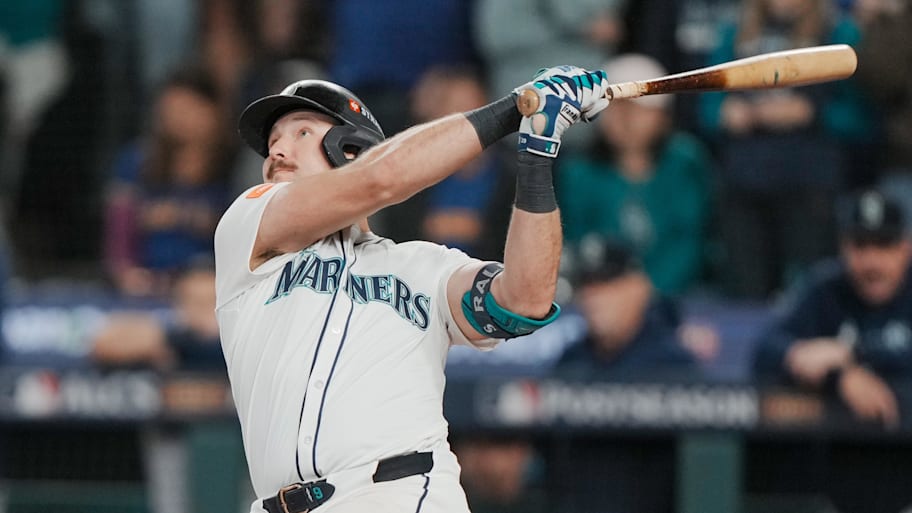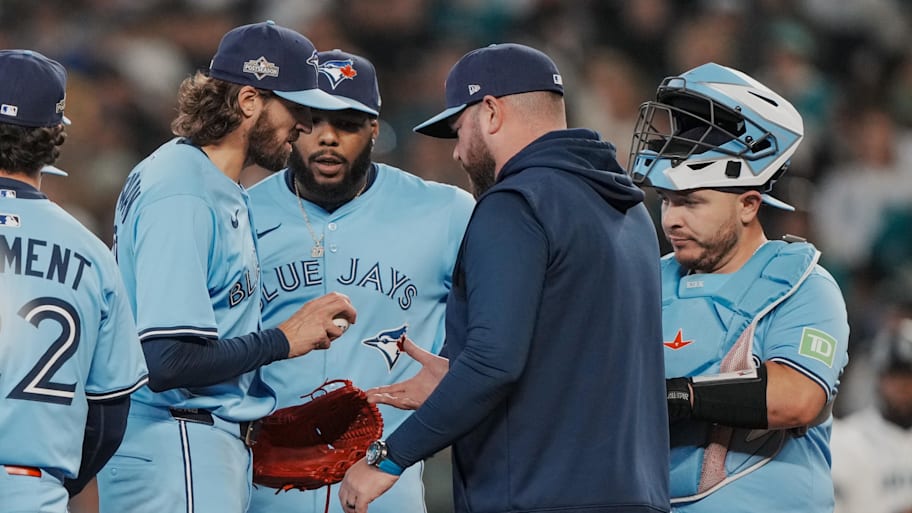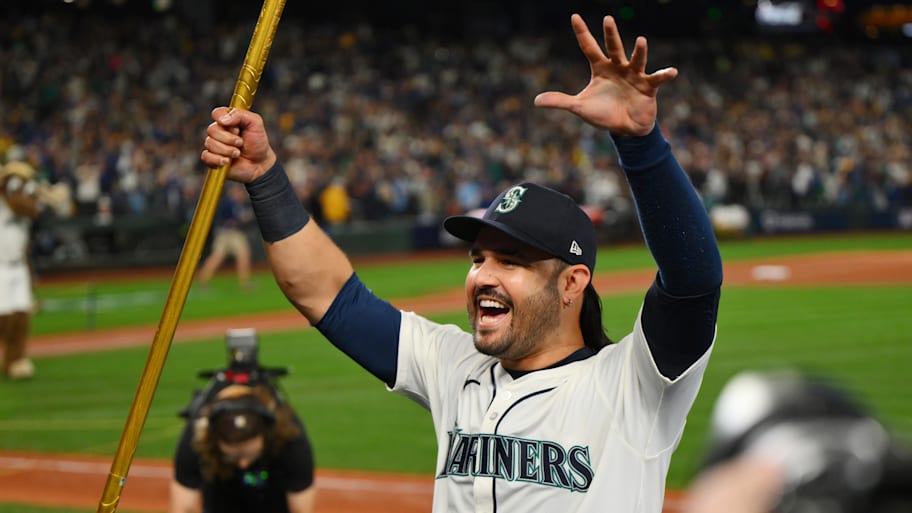SEATTLE – These are the moments we hold dearest. When everything seems to come together perfectly, as opportunity meets joy. For someone like Eugenio Suárez, a 34-year-old veteran of 12 major league seasons and four teams and a .186 hitter in his second go-round with the Mariners, everything he loves most was within his grasp.
It did not matter that it happened as he was squeezed between a box truck and a concrete wall in a hallway outside the Mariners’ clubhouse Friday night. On the greatest night of his peripatetic baseball life, he held tight to his wife, Genesis, and his daughters, Nicolle and Melanie.
“This part is the best part of everything,” Suárez said. “This is something that you dream of. To be honest, to see the happiness of my daughters and my wife—they’ve been incredible supporting me—is the best.”
Oh, and that home run? The one that will take its place next to The Double by Edgar Martínez 30 years ago among the biggest moments in 50 seasons of Seattle baseball? The one that came with the bases loaded in the eighth inning of a tie game and put the Mariners one win from the World Series for the first time? The home run that made yet another manager pay for getting too cute running these postseason games? The home run off a Seranthony Domínguez 3–2 fastball that gave Seattle a roof-shaking 6–2 victory?
Yeah, that was not bad, either.
Genesis and the girls had flown in from Miami only the previous night, getting here around midnight. They arrived just in time, just as their daddy did.
“It makes it even more special,” Suárez said. “They were coming from Miami, a long way. Just for them to come such a long way and for me to do it in front of them is … I don’t know, it’s something. It’s something else.”
Suárez is known to be one of the good guys of the game with such a professional reputation that when the Mariners acquired him for a second time, this time from the Diamondbacks in a trade deadline deal, there was more talk about how he fit into the clubhouse than his 36 home runs. He finished with 49 homers, tying a career high, but his bat otherwise was a bust in the final two months of the regular season. Those 53 games are moot now, subsumed by a gigantic home run that should never have happened this way but for the cooperation of the Toronto Blue Jays.

The Blue Jays were six outs away from going home needing one win for their first pennant in 32 years. Their 2–1 lead was facilitated by too-cute maneuverings from Seattle manager Dan Wilson, who with a 1–0 lead, pulled his best starter, Bryce Miller, who had thrown 10 shutout innings in this series against Toronto, in the fifth inning with the 8–9 hitters due up and a bunting situation. His first two options out of the bullpen each allowed run-scoring hits to create the deficit.
As in a sloppy tennis match, it then became the turn of Toronto manager John Schneider to make an unforced error. The last, biggest at-bat in the way of a Toronto win was Cal Raleigh, the major league home run leader, who was leading off the eighth inning for Seattle. The right and obvious move is to bring in your best reliever, your closer, for the biggest at-bat remaining. You do not save him to pitch the ninth inning against the bottom of the lineup. The game was on the line now.
And yet Schneider never had his closer, Jeff Hoffman, a 10-year veteran with 33 saves, warming. The manager brought in Brendon Little, a workmanlike lefty who had pitched only five times this year with a one-run lead in the eighth.
All series, Scheider has been partially driven by the Law of Exposure—the theory that the more opposing hitters see the same reliever over the course of a series the less effective the reliever becomes. It sounds plausible. Only it ignores track records, experience, stuff and what the scoreboard tells you.
“I wanted to see that part of the lineup see different guys,” Schneider said, as the 2-3-4 hitters were coming up for Seattle. “We talked about it all series. Little’s been one of our best pitchers in big spots. Tough guy to elevate. Cal’s a really good hitter.”
Behind home plate, about 20 rows back, Todd Raleigh, Cal’s dad and a veteran college coach, could scarcely believe it. The most dangerous part of the lineup was coming up for what should be the last time and the closer was not in the game.
“Yes, I was very surprised,” Todd said.
Cal, a switch hitter, had not taken a right-handed swing in a week. Todd knew that did not matter. As soon as Cal was old enough to stand, barely one year old, Todd put a big-barreled red plastic bat in his hands and practically handed him a soft ball for him to hit. Todd showed baby Cal how to switch his hands on his grip depending on whether he was swinging right-handed or left-handed. Nearly from the cradle, Cal Raleigh was a born switch hitter.
“I never wanted my boys to think one side was a strong side and one side was a weaker side,” Todd said.
Little threw one sinker. And then another. Cal took both. And then a third. This time he swung right-handed for the first time in a week. Raleigh hit it so high it was in the air for five seconds. For five seconds, an eternity for the outcome of a batted ball to be held in doubt, all of T-Mobile Park was an enormous snow globe, a tableau of wonder frozen in time. Necks craned, breath ceased, hope and fear filled the void. Left fielder Nathan Lukes drifted and drifted under it until his back was against the wall.
When the baseball finally landed, the game was tied. Raleigh had his 64th homer of the year. If anything, Schneider got burned by one of his best traits: his admirable faith in his entire roster.
“I trust every single guy on this roster, you know,” Schneider said. “It’s hard. No one feels worse than Little. No one feels worse than Ser right now, or me. But I trust every single guy on this roster.”

In Game 1, Schneider pulled his ace, Kevin Gausman, after just 76 pitches in which only a homer by Raleigh ended a streak of 16 straight batters retired. The Toronto bullpen lost the game. Schneider admitted he “had a hard time sleeping” after that decision.
In Game 5, he pulled Gausman quickly again, this time with 91 pitches after a two-out walk in the sixth. The Mariners were happy to see Gausman gone after they chased vainly at his splitter like trying to swat gnats in a windstorm. Gausman had 15 swings and misses, the most in his 11 career postseason games. Thirteen whiffs came on the 23 times Seattle tried to hit his splitter.
Louis (Everyday) Varland pitched out of the inning with a walk, but Schneider had started the bullpen carousel, which should not be a top priority. Schneider would commit the kind of unforced error that should never happen in October: losing a lead and a close game late without ever using your closer.
“Yeah, I thought about it, for sure,” Schneider said about putting Hoffman on Raleigh. Weirdly, Schneider put Hoffman on Raleigh in the eighth inning the previous night in a blowout win, 8–2. Hoffman retired him on a pop-up.
“Again, I think being … decisions are hard,” Schneider said. “I think being convicted in a process is important. You make a decision, and you leave it behind you. It’s part of baseball. Second-guessing is part of it.
“Thought about it, for sure. And, again, we have relied on every single guy on our roster to get a lot of wins this year. So I could have done that, and then you think about who do you want in the ninth inning, who do they have coming up? So, yeah, we talked about that situation, for sure. Unfortunately, it didn’t work out.”
The ninth inning would have been the bottom of the lineup. The game in the balance was when Raleigh stepped into the box to lead off. Little walked two batters, forcing Schneider to pull him. Still no Hoffman. Dominguez was next. Suárez is not a great two-strike hitter (.127), but he is dangerous because he retains his “A” swing. His homer was his 15th with two strikes.
The limb Scheider chose on his decision tree enabled Suárez a short time later to be sitting in the interview room with his two daughters by his side. Suárez originally signed in 2008 with the Tigers as a 17-year-old from Venezuela. Seventeen years later, this is the first time he is playing in a League Championship Series. Tears welled in his eyes as he tried to comprehend the meaning of what he had just done.
“Today was very special not only because I hit the grand slam,” he said, “but I give the opportunity to my daughters and my wife watching. They came here last night for this type of game. And I’ve been waiting for this. I just feel so grateful right now and feel so good because we’re going to Toronto with an opportunity in front of us to go to a World Series.
“I have a good amount of beautiful moments in my career, but today is something else.”
There will be pictures, many pictures, by which to remember the moment. Suárez following his long flyball to right field, the first fastball he hit the other way for a homer since July. Suarez floating around the bases, all the while saying a prayer of thanks. Suarez putting his hands together in the shape of a heart as he crossed home plate. Suarez looking for Genesis and the girls in the stands.
But no frame will hold the moment he shared the best night of his baseball night with his family. That is forever preserved in his heart.
More MLB on Sports Illustrated
This article was originally published on www.si.com as Eugenio Suárez’s First Major October Moment Couldn’t Have Come at a Better Time.
